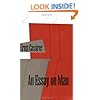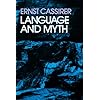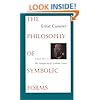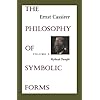A great contemporary German philosopher attacks the explosive problem of political myth in our day, and reveals how the myth of the state evolved from primitive times to prepare the way for the rise of the modern totalitarian state. "A brilliant survey of some of the major texts in the history of political theory."—Kenneth Burke, The Nation.
| ||||||||||||||||||||||||
Book Description
Special Offers and Product Promotions
- Buy $50 in qualifying physical textbooks, get $5 in Amazon MP3 Credit. Here's how (restrictions apply)
Frequently Bought Together
Editorial Reviews
Review
“This scholarly work by a truly great spirit should be read by every trained mind in search of deeper understanding of the world. One of the rare `grand' books.”–Library Journal
--This text refers to an out of print or unavailable edition of this title.
From the Publisher
This scholarly work by a truly great spirit should be read by every trained mind in search of deeper understanding of the world. One of the rare `grand' books.
--This text refers to an out of print or unavailable edition of this title.
Product Details
Would you like to update product info or give feedback on images?
|
More About the Author
Discover books, learn about writers, read author blogs, and more.
Customer Reviews
|
Share your thoughts with other customers:
|
||||||||||||||||||||||
|
Most Helpful Customer Reviews
26 of 26 people found the following review helpful:
5.0 out of 5 stars
Do States Have a Mythos?,
By
This review is from: The Myth of the State (Paperback)
This insightful book marks the end of Ernst Cassirer's career and suggests that his impact upon the social sciences will continue to grow. Perhaps this book's central feature is it's application of Cassirer's philosophy of symbolic forms to 20th century political thought. Beginning with a lean and incisive analysis of myth and culminating with an inspection of modern authoritarianism, Cassirer succeeds in marrying an understanding of culture with an analysis of political phenomena. Readers familiar with the Western tradition of political philosophy will find their background knowledge put to good use here, as the majority of the text centers around considering various mythic conceptions prevalent in Western political theory up to Hitler's Third Reich. Cassirer's approach, consistent with his other works, is to stress synthetic conclusions with comprehensive analysis.
The text can be divided into roughly three major section, each of which draws from Cassirer's previous work. The first major section is Cassirer's short exposition of his philosophy of symbolic forms. The reader is provided with several chapters identifying key elements of myth, including language, emotions, and social life. From this domain, Cassirer draws a general theory of culture, and a theory of myth in particular. His orientation to studying culture is largely operative, as he considers how myth functions emotively, cognitively, and socially. In the next section, Cassirer approaches the question of the Western state's origins, particularly in relation to the Greek, medieval, and Renaissance traditions. All through reviewing major political theories (e.g. Machiavelli, Hegel, etc.), Cassirer applies his functional analysis of myth, noting how Western thought developed out of myth, but does not entirely escape its influence. The final section finds Cassirer considering the genesis of modern totalitarianism, once again by working through influential thinkers. Among these include Hegel's formulation of the State, Thomas Carlyle's hero worship, and Joseph A. C. de Gobineau's theory of racism. The last chapter, entitled "The Technique of Modern Political Myths" will be the most fascinating for reader's familiar with Cassirer's other major works. Here we find Cassirer in high form: An advocate of Kant's Aufklarung in an uncertain world shaped by powerful, misunderstood forces of culture. Sadly, Cassirer passed away suddenly before this section could be completed. Still, the final note is resounding. Writing in an unusually strong tone about how to address the advocates and agents of political myths, Cassirer concludes: "We should see the adversary face to face in order to know how to combat him." In this task, Cassirer advocates that philosophy is our chief tool in understanding myth and that this task is necessary to advance self-understanding beyond even contemporary bounds.
2 of 2 people found the following review helpful:
3.0 out of 5 stars
More Theory than Myth of the State,
Amazon Verified Purchase(What's this?)
This review is from: The Myth of the State (Paperback)
While Ernst Cassirer provides an illuminating analysis of the nature of myth in The Myth of the State, he never tells his reader what the western myth of the state is. Extrapolating from his analysis of Plato, Augustine, Thomas Aquinas, Machiavelli, Carlyle, the racist Gobineau, Hegel, et al, what emerges is the unfolding of a theory of the state, not a mythos of it. The passionate and emotive elements of myth, which Cassirer brilliantly explicates about myth in general, are never made explicit in his analysis of the theory ("myth") of the state (except at the end when he discusses Nazism). If anything, these elements are subsumed in the content of his analysis.
Nevertheless, Cassirer masterfully explains much of the development of the western theory of the state through time. He hits on many of the salient thinkers and philosophical movements. Yet, inexplicably, some important thinkers seem to get short shrift comparatively speaking (e.g. Aristotle) and others scarcely manage more than a brief mention (e.g. Marx). Readers might find (what turned out to be) Cassirer's parting shot at Heidegger and the proto-fascist elements of his philosophy fascinating (Cassirer died in 1945 and The Myth of the State was published posthumously). Perhaps most intriguing is how Cassirer reserves most of his ire for Hegel, arguably making his philosophy most responsible for the intellectual underpinnings of the rise of National Socialism in Germany--an analysis not entirely unpredictable for a neo-Kantian like Cassirer to make given how, in the historical estimation of many, Hegel eclipsed Kant as Germany's preeminent philosopher. Notwithstanding these limitations, The Myth of the State is worth reading. Cassirer's analysis of the development of the western theory of the state is evidently too sagacious to be missed.
6 of 8 people found the following review helpful:
2.0 out of 5 stars
The myth of Ernst Cassirer,
By Ashtar Command "Seeker" (Stockholm, Sweden) - See all my reviews
This review is from: The Myth of the State (Paperback)
Can a book be both lucidly written, highly erudite and yet completely meaningless?
It seems that it can. "The Myth of the State" by Neo-Kantian philosopher Ernst Cassirer is such a book. The positive reviewers were obviously taken in by Cassirer's unusually lucid style of writing, and by his erudition, which is considerable. And yet, the book never really delivers. It's supposed to be an analysis of the historic and philosophical roots of modern totalitarianism. Instead, it feels like a series of disjointed essays about pretty much everything. Subjects covered include the meaning and function of myth, the exact relationship between Carlyle and Goethe, whether or not Machiavelli really was Old Nicky, the Romantic criticism of the Enlightenment, the racism of Gobineau, and countless other subjects besides. However, Cassirer never manages to weave the strands together. Interestingly, he never mentions Marx, Lenin or Nietzsche, the usual whipping boys in books of this type. Apparently, the book is unfinished and was published posthumously. I don't deny that it may contain this or that interesting reflection, but overall it feels like a non-starter. I suspect it's mostly of interest to scholars of Neo-Kantianism. Curiously, Cassirer (or perhaps his publisher) also expected the American audience to understand Latin and German (!), since all Latin quotations and some German ones are untranslated. Unfortunately, I cannot give "The Myth of the State" more than two stars.
Share your thoughts with other customers: Create your own review
|
|
Inside This Book
(learn more)
First Sentence:
IN THE last thirty years, in the period between the first and the second World Wars, we have not only passed through a severe crisis of our political and social life but have also been confronted with quite new theoretical problems. Read the first page Key Phrases - Statistically Improbable Phrases (SIPs): (learn more)
modern political myths, race worship, new principalities, mythical conceptions, scholastic thinkers Key Phrases - Capitalized Phrases (CAPs): (learn more)
New York, Thomas Aquinas, Sartor Resartus, French Revolution, Middle Ages, Cesare Borgia, Machiavelli's Prince, Max Muller, Friedrich Schlegel, City of God, Phenomenology of Mind, Loeb Classical Library, Clarendon Press, Fathers of the Church, Hugo Grotius, Marcus Aurelius, Patrologia Latina, Plato's Republic, Selected Essays, Albert the Great, Charles Scribner, George Allen, Indian Empire, Roman Empire, Anselm of Canterbury New!
Books on Related Topics | Concordance | Text Stats Browse Sample Pages:
Front Cover | Table of Contents | First Pages | Index | Back Cover | Surprise Me!
IN THE last thirty years, in the period between the first and the second World Wars, we have not only passed through a severe crisis of our political and social life but have also been confronted with quite new theoretical problems. Read the first page Key Phrases - Statistically Improbable Phrases (SIPs): (learn more)
modern political myths, race worship, new principalities, mythical conceptions, scholastic thinkers Key Phrases - Capitalized Phrases (CAPs): (learn more)
New York, Thomas Aquinas, Sartor Resartus, French Revolution, Middle Ages, Cesare Borgia, Machiavelli's Prince, Max Muller, Friedrich Schlegel, City of God, Phenomenology of Mind, Loeb Classical Library, Clarendon Press, Fathers of the Church, Hugo Grotius, Marcus Aurelius, Patrologia Latina, Plato's Republic, Selected Essays, Albert the Great, Charles Scribner, George Allen, Indian Empire, Roman Empire, Anselm of Canterbury New!
Books on Related Topics | Concordance | Text Stats Browse Sample Pages:
Front Cover | Table of Contents | First Pages | Index | Back Cover | Surprise Me!
Citations (learn more)
This book cites 74
books:
 See all 74 books this book cites
See all 74 books this book cites
100
books
cite this book:
 See all 100 books citing this book
See all 100 books citing this book
- Sartor Resartus (Oxford World's Classics) by Thomas Carlyle on 18 pages
- Philosophy of History (Great Books in Philosophy) by Georg Wilhelm Friedri Hegel on 8 pages
- Philosophy of Right (Dover Philosophical Classics) by Georg W. F. Hegel on 6 pages
- The Phenomenology of Mind (Philosophical Classics) by Georg W. F. Hegel on 6 pages
- Past and Present by Thomas Carlyle by Richard Altick on 4 pages
- Enduring Western Civilization: The Construction of the Concept of Western Civilization and Its "Others" by Silvia Federici on 4 pages
- Humanism of the Other by Emmanuel Levinas on 4 pages
- Discourses on Strauss: Revelation And Reason in Leo Strauss And His Critical Study of Machiavelli by Kim A. Sorensen on 4 pages
- Philosophie und Mythos: Ein Kolloquium (German Edition) on 4 pages
- Strategies of Remembrance: The Rhetorical Dimensions of National Identity Construction (Studies in Rhetoric/Communication) by M. Lane Bruner on page 89, Back Matter (1), and Back Matter (2)
What Other Items Do Customers Buy After Viewing This Item?
Tags Customers Associate with This Product(What's this?)Click on a tag to find related items, discussions, and people.
|
Sell a Digital Version of This Book in the Kindle Store
If you are a publisher or author and hold the digital rights to a book, you can sell a digital version of it in our Kindle Store.
Learn more
Customer Discussions
|
This product's forum
Active discussions in related forums
Search Customer Discussions
|
Related forums
|
















